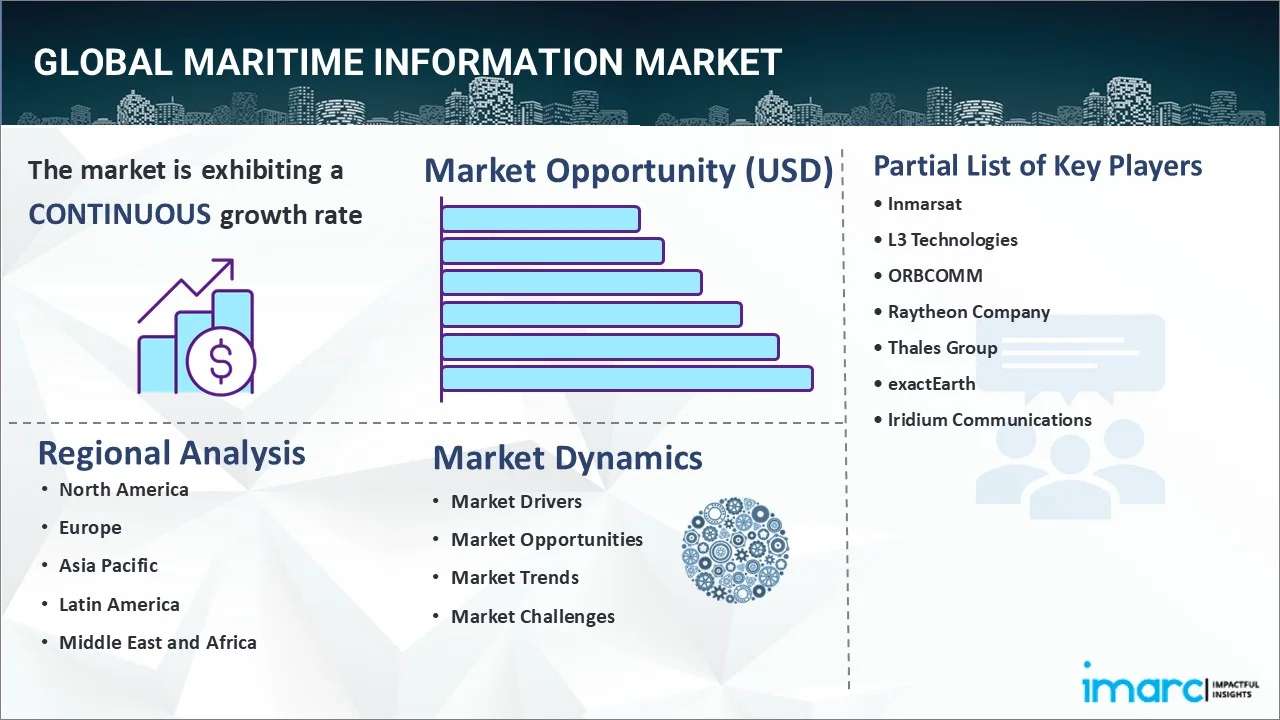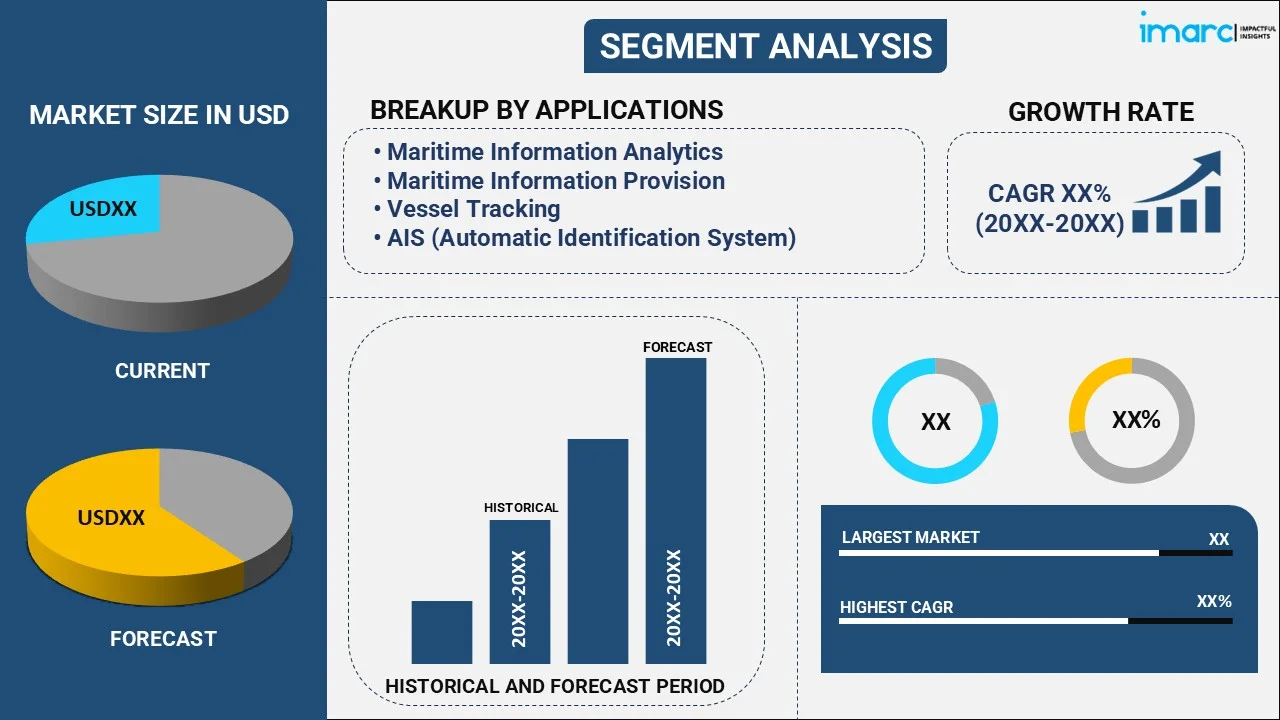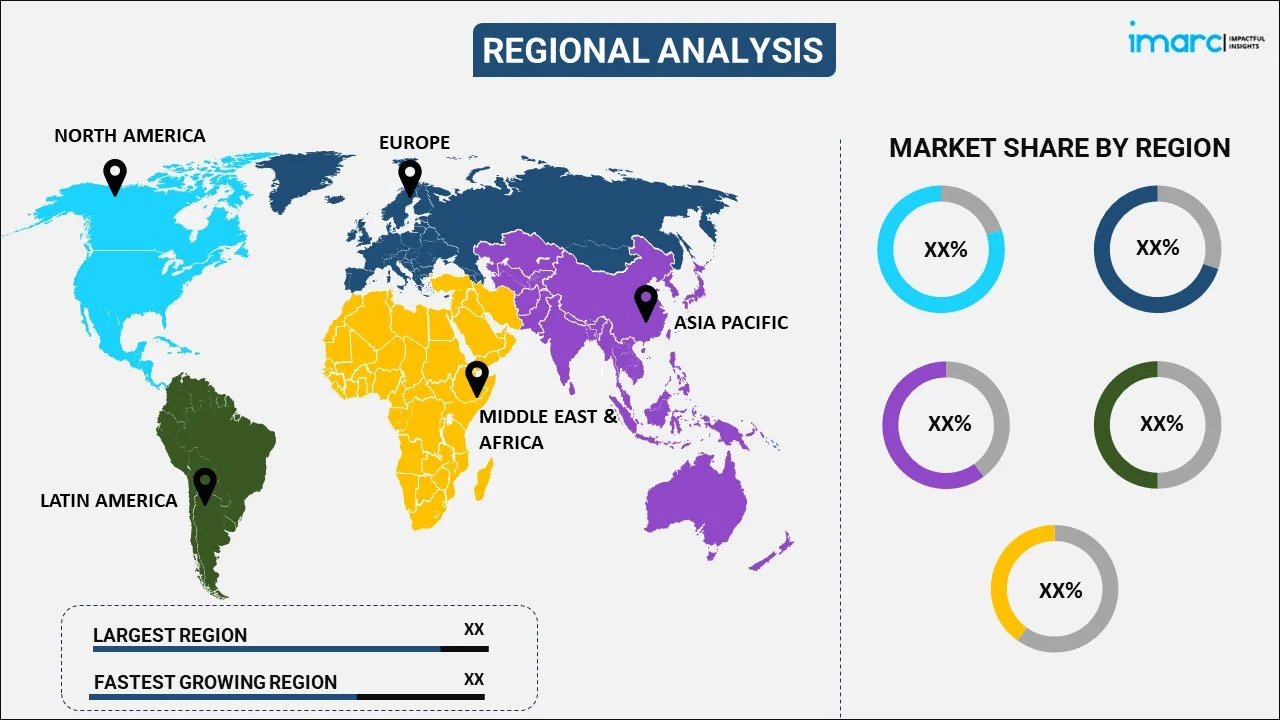
Maritime Information Market Report by Application (Maritime Information Analytics, Maritime Information Provision, Vessel Tracking, AIS (Automatic Identification System)), End-User (Government, Commercial), and Region 2025-2033
Maritime Information Market Size:
The global maritime information market size reached USD 2.2 Billion in 2024. Looking forward, IMARC Group expects the market to reach USD 4.5 Billion by 2033, exhibiting a growth rate (CAGR) of 8.21% during 2025-2033. The market is experiencing steady growth driven by increasing concerns about maritime safety, security, and environmental protection, the escalating demand for efficient and optimized shipping operations, and stringent regulations implemented by governing agencies to enhance safety in the maritime industry.
|
Report Attribute
|
Key Statistics
|
|---|---|
|
Base Year
|
2024
|
|
Forecast Years
|
2025-2033
|
|
Historical Years
|
2019-2024
|
|
Market Size in 2024
|
USD 2.2 Billion |
|
Market Forecast in 2033
|
USD 4.5 Billion |
| Market Growth Rate 2025-2033 | 8.21% |
Maritime Information Market Analysis:
- Market Growth and Size: The market is witnessing strong growth, which can be attributed to the increasing demand for real-time data and insights in the maritime sector. Additionally, rising concerns about maritime safety and security, along with the need for efficient fleet management, is propelling the growth of the market.
- Technological Advancements: Innovations, such as the integration of Internet of Things (IoT) and satellite communication systems, are revolutionizing data collection and transmission in the maritime domain. Moreover, artificial intelligence (AI) and machine learning (ML) are enhancing data analytics and predictive maintenance capabilities.
- Industry Applications: The maritime information finds applications in various applications, including shipping, offshore energy, fisheries, and port management. It also supports navigation, weather forecasting, cargo tracking, and environmental monitoring.
- Geographical Trends: Europe leads the market, on account of its extensive maritime activities, including shipping, port operations, and offshore energy exploration. However, North America is emerging as a fast-growing market, driven by the rising focus on maritime security and port efficiency.
- Competitive Landscape: Leading players in the market include companies specializing in data analytics, satellite communication, and maritime software. The competitive landscape is characterized by partnerships and acquisitions to enhance service offerings.
- Challenges and Opportunities: While the market faces challenges, such as cybersecurity threats, data privacy concerns, and the high cost of implementing advanced maritime information systems, it also encounters opportunities in leveraging big data for predictive maintenance, enhancing supply chain efficiency, and addressing sustainability goals.
- Future Outlook: The future of the maritime information market looks promising, with advancements in digitalization and increased automation. It is likely to witness greater consolidation among market players and an increasing focus on sustainability and eco-friendly solutions.

Maritime Information Market Trends:
Growing concerns about maritime safety and security
Increasing concerns about maritime safety, security, and environmental protection are pivotal in driving the market. Maritime accidents, piracy incidents, and environmental disasters are underscoring the need for robust data and information systems in the maritime sector. In addition, ship owners and operators are increasingly investing in advanced technologies and information systems that provide real-time tracking, monitoring, and analytics capabilities. These systems enable proactive risk management, ensuring the safety of vessels, crew, and cargo. Moreover, regulatory bodies and international organizations are imposing stringent regulations and reporting requirements on the maritime industry, further catalyzing the demand for comprehensive maritime information solutions to ensure compliance and transparency. Overall, the imperative to enhance safety, security, and environmental stewardship in the maritime sector is contributing to the growth of the market.
Expanding shipping industry
The expanding shipping industry is strengthening the growth of the market. As international trade is growing, the demand for efficient and optimized shipping operations is rising. The maritime sector plays a critical role in the global supply chain, with maximum global trade transported by sea. This growth in shipping activities necessitates advanced information systems to manage vessels, cargo, and routes effectively. To remain competitive and meet consumer demands for faster and more reliable shipping services, shipping companies are increasingly relying on maritime information solutions. These solutions provide real-time data on vessel positions, weather conditions, port congestion, and more, enabling efficient route planning, cargo tracking, and on-time deliveries. The need for improved operational efficiency and cost reduction in the shipping industry is propelling the adoption of maritime information technology.
Regulatory compliance requirements
Governments and international organizations are introducing stringent regulations to enhance safety, security, and environmental standards in the maritime industry. These regulations encompass various aspects, including vessel tracking and monitoring, emissions control, and safety reporting. To meet these requirements, ship owners and operators are investing in advanced information systems and technologies. In addition, the International Maritime Organization (IMO) is implementing regulations, such as the International Convention for the Safety of Life at Sea (SOLAS) and the International Maritime Solid Bulk Cargoes (IMSBC) Code. These regulations necessitate accurate cargo information, safety equipment data, and real-time communication capabilities. Compliance with these regulations is not only a legal obligation but also crucial for avoiding penalties and maintaining a positive industry reputation.
Rise in global trade and cargo volumes
The growing global trade and cargo volumes are offering a favorable market outlook. As international commerce is expanding, the maritime sector is facing increasing demands for the transportation of goods and commodities. Trade globalization is leading to larger vessels, more complex supply chains, and a need for greater efficiency. Maritime information systems enable shipping companies to optimize their operations, reduce transit times, and handle larger cargo volumes effectively. Moreover, the shift towards e-commerce and digital trade, further increasing the reliance on maritime transport for the movement of goods. This rise in demand is underscoring the importance of real-time information for efficient cargo handling and supply chain management.
Maritime Information Industry Segmentation:
IMARC Group provides an analysis of the key trends in each segment of the market, along with forecasts at the global, and regional levels for 2025-2033. Our report has categorized the market based on application and end-user.
Breakup by Application:

- Maritime Information Analytics
- Maritime Information Provision
- Vessel Tracking
- AIS (Automatic Identification System)
Maritime information analytics accounts for the majority of the market share
The report has provided a detailed breakup and analysis of the market based on the application. This includes maritime information analytics, maritime information provision, vessel tracking, and AIS (automatic identification system). According to the report, maritime information analytics represented the largest segment due to the increasing demand for data-driven insights in the maritime industry. This segment involves the analysis of vast datasets to provide valuable insights into vessel behavior, route optimization, fuel efficiency, and predictive maintenance. Maritime companies are leveraging analytics to enhance operational efficiency, reduce costs, and improve safety and environmental compliance. With the growth of big data and machine learning (ML) capabilities, maritime information analytics is poised for further expansion.
Maritime information provision involves the collection, processing, and dissemination of real-time information related to weather conditions, port congestion, navigation hazards, and maritime regulations. This segment caters to the need for accurate and up-to-date information for safe and efficient voyage planning and execution. Shipping companies, port authorities, and maritime service providers rely on this segment to access crucial data for decision-making and operational management.
Vessel tracking is a vital application within the market, focusing on monitoring the real-time positions and movements of vessels at sea. This technology utilizes satellite-based tracking systems, such as automatic identification system (AIS) and satellite communication, to provide accurate vessel location data. Vessel tracking is essential for navigation safety, maritime security, and search and rescue operations. It enables stakeholders to track vessel movements, identify potential collisions, and ensure compliance with international regulations.
AIS is a specialized sub-segment of vessel tracking that allows vessels to broadcast their identity, position, course, and speed to other nearby vessels and coastal authorities. It enhances situational awareness, collision avoidance, and maritime traffic management. AIS is mandated for use on most commercial vessels, making it a critical component of maritime information systems.
Breakup by End-User:
- Government
- Defense
- Intelligence and Security
- Search and Rescue
- Government Agency
- Others
- Commercial
- Port Management
- Business Intelligence
- Commercial Fishing
- Commercial Shipping
- Hydrographic and Charting
- Commercial Offshore
- Others
Commercial represents the leading market segment
The report has provided a detailed breakup and analysis of the market based on the end-user. This includes government (defense, intelligence and security, search and rescue, government agency, others) and commercial (port management, business intelligence, commercial fishing, commercial shipping, hydrographic and charting, commercial offshore, and others). According to the report, commercial represented the largest segment.
The commercial sector includes a diverse range of entities, such as shipping companies, logistics providers, port operators, cargo owners, and offshore energy companies. These commercial users rely on maritime information solutions for various purposes, including vessel management, cargo tracking, supply chain optimization, and operational efficiency. The need to reduce operational costs, enhance competitiveness, and improve overall business performance is driving the adoption of maritime information technology within the commercial sector. Additionally, as global trade and shipping activities are expanding, the demand for real-time data and insights in the commercial maritime industry is rising.
The government sector in the market encompasses agencies and authorities responsible for maritime safety, security, and regulatory compliance. This includes coast guards, maritime law enforcement agencies, port authorities, and environmental protection agencies. Governments use maritime information systems to monitor vessel traffic, enforce maritime regulations, respond to emergencies, and ensure compliance with international maritime conventions. The emphasis on maritime security and environmental protection is leading to increasing government investments in advanced information technology for maritime surveillance and management.
Breakup by Region:

- Europe
- North America
- Asia Pacific
- Middle East and Africa
- Latin America
Europe leads the market, accounting for the largest maritime information market share
The market research report has also provided a comprehensive analysis of all the major regional markets, which include Europe, North America, Asia Pacific, the Middle East and Africa, and Latin America. According to the report, Europe accounted for the largest market share on account of its extensive maritime activities, including shipping, port operations, and offshore energy exploration. The region is home to major maritime economies, such as the Netherlands, Denmark, and Norway. European countries prioritize maritime safety, environmental sustainability, and technological innovation, leading to a high demand for advanced maritime information systems.
North America is another significant region in the market, particularly due to extensive coastlines and maritime trade in the United States and Canada. The region has a strong focus on maritime security, port efficiency, and environmental protection, leading to substantial adoption of maritime information technology. The presence of major ports on the East and West coasts and the Great Lakes ensures a steady demand for vessel tracking, cargo management, and maritime analytics solutions in North America.
The Asia Pacific region is characterized by its rapid economic growth, making it a dynamic segment in the market. Countries like China, Japan, South Korea, and Singapore are major players in global shipping and trade. The Asia Pacific region is witnessing significant maritime traffic and investments in port infrastructure. As a result, there is a growing need for maritime information systems to manage and optimize these operations efficiently.
The Middle East and Africa region, with its extensive coastlines, ports, and offshore oil and gas operations, represents a developing but promising segment in the market. Countries like the United Arab Emirates, Saudi Arabia, and South Africa are investing in maritime technology to improve port operations, enhance maritime security, and support offshore activities.
Latin America is an emerging segment in the market, with countries like Brazil, Chile, and Mexico playing key roles in the maritime industry. The vast coastline, shipping activities, and offshore exploration in the region offer growth opportunities for maritime information solutions.
Leading Key Players in the Maritime Information Industry:
Key players in the market are actively engaged in several strategic initiatives to meet the evolving demands of the industry. They are continuously investing in research and development (R&D) activities to enhance their data analytics and predictive maintenance capabilities, enabling more efficient vessel operations. They are also expanding their service offerings to provide comprehensive maritime information solutions, including vessel tracking, weather forecasting, and environmental monitoring, catering to the diverse needs of their consumers. Collaborations and partnerships with other industry stakeholders are common to create integrated solutions and provide a seamless experience for end-users. Additionally, these players are focusing on cybersecurity measures to protect sensitive maritime data and ensure the safety and security of vessels and cargo in an increasingly interconnected maritime ecosystem.
The market research report has provided a comprehensive analysis of the competitive landscape. Detailed profiles of all major companies have also been provided. Some of the key players in the market include:
- Inmarsat
- L3 Technologies
- ORBCOMM
- Raytheon Company
- Thales Group
- exactEarth
- Iridium Communications
(Please note that this is only a partial list of the key players, and the complete list is provided in the report.)
Latest News:
- June 20, 2022: Inmarsat signed a Memorandum of Understanding (MoU) with Fameline Holding Group (FHG) to extend an existing strategic collaboration. The MoU expresses the intent of both organizations to explore joint initiatives across the maritime and energy sectors to benefit both parties.
- September, 2022: Iridium Communications announced that Jan De Nul Group, a leading maritime construction and civil engineering company, has become the latest fleet to select Iridium's Global Maritime Distress and Safety System (GMDSS) solution. By adopting Iridium® GMDSS, Jan De Nul is continuing its commitment to ensure the safest operating environment possible for its personnel.
Maritime Information Market Report Scope:
| Report Features | Details |
|---|---|
| Base Year of the Analysis | 2024 |
| Historical Period | 2019-2024 |
| Forecast Period | 2025-2033 |
| Units | Billion USD |
| Scope of the Report | Exploration of Historical Trends and Market Outlook, Industry Catalysts and Challenges, Segment-Wise Historical and Future Market Assessment:
|
| Applications Covered | Maritime Information Analytics, Maritime Information Provision, Vessel Tracking, AIS (Automatic Identification System) |
| End-Users Covered |
|
| Regions Covered | Europe, North America, Asia Pacific, Middle East and Africa, Latin America |
| Companies Covered | Inmarsat, L3 Technologies, ORBCOMM, Raytheon Company, Thales Group, exactEarth, Iridium Communications, etc. |
| Customization Scope | 10% Free Customization |
| Post-Sale Analyst Support | 10-12 Weeks |
| Delivery Format | PDF and Excel through Email (We can also provide the editable version of the report in PPT/Word format on special request) |
Key Benefits for Stakeholders:
- IMARC’s industry report offers a comprehensive quantitative analysis of various market segments, historical and current market trends, market forecasts, and dynamics of the maritime information market from 2019-2033.
- The research report provides the latest information on the market drivers, challenges, and opportunities in the global maritime information market.
- The study maps the leading, as well as the fastest-growing, regional markets.
- Porter's five forces analysis assists stakeholders in assessing the impact of new entrants, competitive rivalry, supplier power, buyer power, and the threat of substitution. It helps stakeholders to analyze the level of competition within the maritime information industry and its attractiveness.
- The competitive landscape allows stakeholders to understand their competitive environment and provides insight into the current positions of key players in the market.
Key Questions Answered in This Report
The global maritime information market was valued at USD 2.2 Billion in 2024.
We expect the global maritime information market to exhibit a CAGR of 8.21% during 2025-2033.
The sudden outbreak of the COVID-19 pandemic had led to the implementation of stringent lockdown regulations across several nations, resulting in the decline of numerous maritime activities, thereby negatively impacting the global market for maritime information.
The increasing geopolitical tensions, along with the rising adoption of maritime information solutions to minimize maritime threats, such as human trafficking, terrorist attacks, environmental destruction, etc., are primarily driving the global maritime information market.
Based on the application, the global maritime information market has been segregated into maritime information analytics, maritime information provision, vessel tracking, and AIS (Automatic Identification System). Among these, maritime information analytics currently holds the largest market share.
Based on the end-user, the global maritime information market can be bifurcated into government and commercial. Currently, the commercial sector exhibits a clear dominance in the market.
On a regional level, the market has been classified into Europe, North America, Asia Pacific, Middle East and Africa, and Latin America, where Europe currently dominates the global market.
Some of the major players in the global maritime information market include Inmarsat, L3 Technologies, ORBCOMM, Raytheon Company, Thales Group, exactEarth, Iridium Communications, etc.
Need more help?
- Speak to our experienced analysts for insights on the current market scenarios.
- Include additional segments and countries to customize the report as per your requirement.
- Gain an unparalleled competitive advantage in your domain by understanding how to utilize the report and positively impacting your operations and revenue.
- For further assistance, please connect with our analysts.
 Request Customization
Request Customization
 Speak to an Analyst
Speak to an Analyst
 Request Brochure
Request Brochure
 Inquire Before Buying
Inquire Before Buying




.webp)




.webp)












